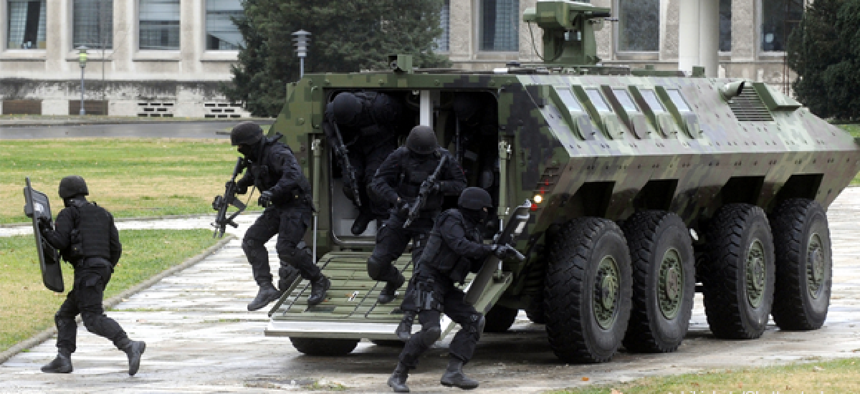Military surplus transfer expands amid security concerns


Connecting state and local government leaders
The Trump administration has lifted restrictions on the transfer of military hardware to law enforcement agencies amid watchdogs' call for tighter security.
The Trump administration announced on Aug. 28 that it was lifting Obama administration-era restrictions that banned the transfer of some surplus military hardware -- such as grenade launchers, armored vehicles and bayonets -- to law enforcement agencies.
Administered by the Defense Logistics Agency, the 1033 program allows the transfer of excess Defense Department property that might otherwise be destroyed to law enforcement agencies across the United States and its territories.
The announcement came one month after the release of a Government Accountability Office report that describes how its investigators were able to bypass the DLA Law Enforcement Support Office's verification process by using fictitious information.
GAO investigators posed as law enforcement officials seeking access to the LESO database. On the basis of the detailed information they gave DLA about the fictitious law enforcement agency, they were approved for the program and granted access to the department’s online systems, where they could view and request controlled property.
They submitted requests for non-lethal items and equipment that could be potentially lethal with modification.
"In less than a week after submitting the requests, our fictitious agency was approved for the transfer of over 100 controlled property items with a total estimated value of about $1.2 million," the GAO report states.
LESO never contacted the investigators in any way other than electronically.
“Using fictitious identification and law enforcement credentials, along with the LESO-approved documentation, our investigator was able to pass security checks and enter the DLA Disposition Services warehouse sites,” the report states. “Personnel at two of the three sites did not request or check for valid identification of our investigator picking up the property.”
Citizens Against Government Waste voiced its security concerns in an Aug. 28 post.
“The DLA’s lack of oversight and internal control of the 1033 program’s largess has clear ramifications,” the post states. “Not only does the current system display an overwhelmingly irresponsible handling of large quantities of taxpayer-funded property, but more disturbingly, it also might enable military-grade weaponry to fall into the hands of unauthorized individuals.”
Those vulnerabilities were at the center of a hearing last month by the House Armed Services Committee’s Readiness Subcommittee.
Mike Scott, deputy director of logistics operations at DLA, testified that the agency is taking the GAO report seriously and will follow its recommendations, including verifying applications and running a fraud risk assessment.
“DLA has made significant enhancements to improve its policies, procedures and internal controls to correct deficiencies in the 1033 program,” Scott testified. “We recognize the importance of providing support to the [law enforcement agencies] and their important mission and our oversight role.”
NEXT STORY: Choose better passwords with the help of science




